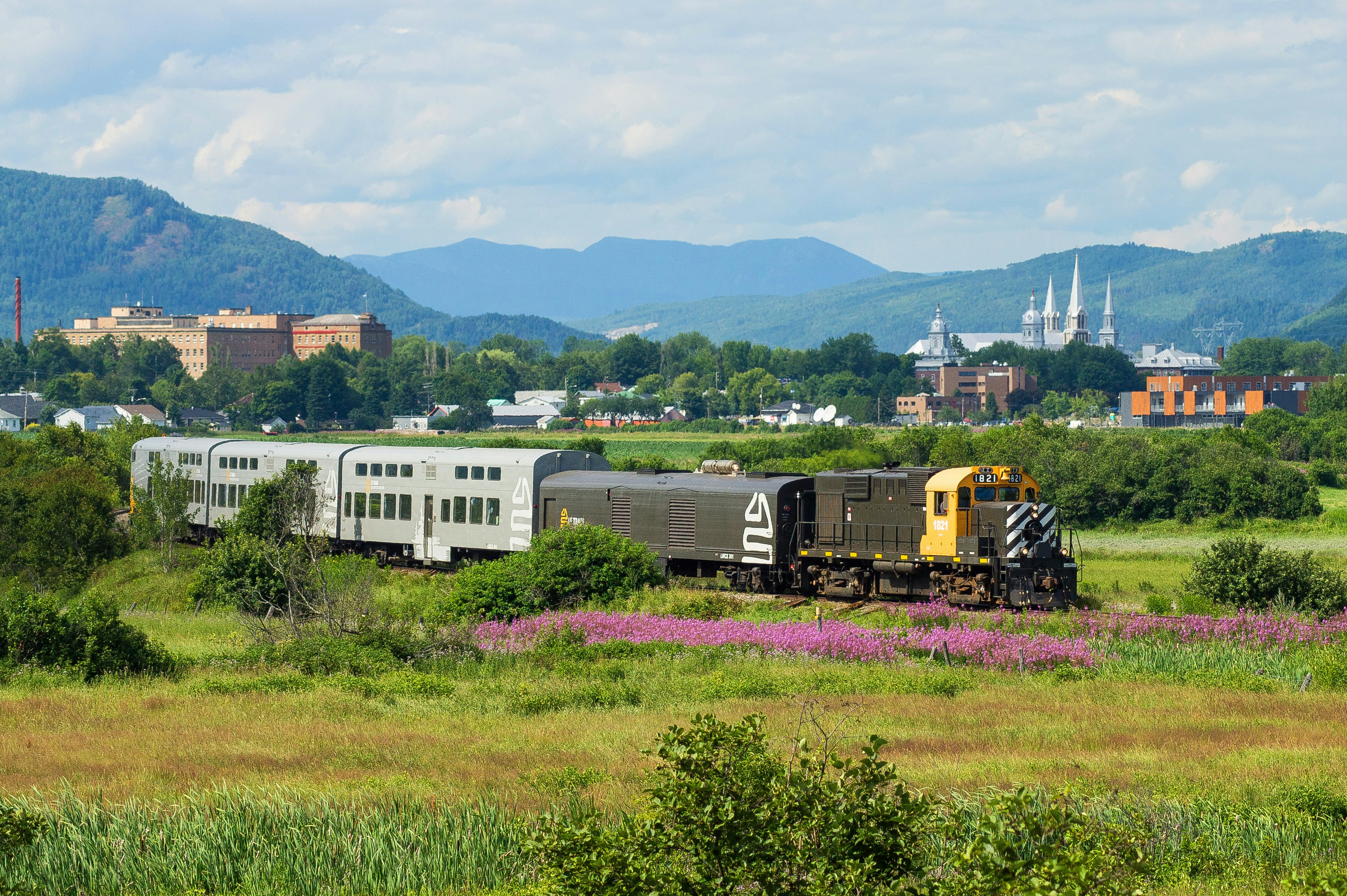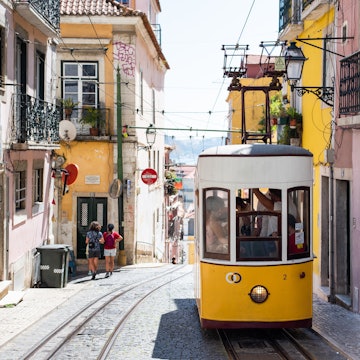
4 overnight train trips to try in Canada besides the Rocky Mountaineer



VIA Rail's Vancouver-bound Canadian passing through Ontario in autumn. Boxcar Media/Shutterstock
The railways are a pillar of Canada's long and storied history. The tracks laid down by engineers in the 19th and early 20th centuries opened up the world's second-largest nation, allowing passage from the Atlantic to the Pacific without the need to navigate the treacherous waters of the Arctic Ocean. Jump forward a hundred years or so, and the trains operated by Canada's national rail company VIA Rail are still the most immersive way to explore this land of big skies and even bigger landscapes.
In fact, passenger services have dwindled since their high point in the 1940s, but a well-oiled transcontinental rail network still spans the country, running all the way from Vancouver in the west to Halifax in the east. Locals tend to focus on the lines along the Toronto–Montréal commuter corridor; longer-distance services are the domain of travelers who believe the process of getting there should be as important as the destination.
Indeed, there are few better ways to absorb Canada's endless conveyor belt of dramatic scenery than from a legendary train such as The Canadian or The Rupert Rocket. But before you hop online to buy a ticket, which are the essential lines to ride? Let us take you on a trip on four of the best overnight train routes in Canada.

1. Vancouver to Toronto on the Canadian
Best for coast-to-coast scenery
Vancouver–Toronto; 4466km (2775 miles), 94 hours
When The Canadian debuted in 1955, this flagship locomotive was the epitome of post-war style. Stainless steel carriages outfitted with art-deco furnishings, 360-degree observatory domes and spacious sleeping cars made The Canadian a must-ride for rail enthusiasts from across the world. The good news? Except for a few sporadic refurbishments, little has changed in the years since.
The journey: Today, the train offers three different classes for the 4-day trip between Vancouver and Toronto: Economy (seat only), Sleeper Plus (with a sleeping berth) and Prestige (in a private compartment). In contrast to covering the same journey by plane, the train's reclining seats are large with plenty of legroom; they're comfortable enough for sleeping, and you can always break the journey in Winnipeg or Jasper.
Sleeping cars are worth the extra investment, with open-plan seats that convert to comfortable berths when it's time to sleep. Prestige-class travel is in lockable compartments for one or two, offering more privacy and more luxurious amenities. All classes have access to Skyline dome cars. Only Prestige gets full access to Park cars with wrap-around windows, with scheduled access for Sleeper Plus customers.
When it comes to meals, the luxury sleeper train’s restaurant offers gourmet dining, from prime rib of beef to pan-roasted halibut, plus alcoholic beverages to sip while the train rocks and sways through the countryside. Bathrooms are invariably well-scrubbed, and performances by musicians and presenters and wine tastings break up the long journey.
The experience: Heading east, the Canadian departs Vancouver late in the day, so travelers have to wait until the following day to enjoy the scenery. But it's worth waiting for the vistas of evergreen British Columbian forests, mountain peaks (including – if you’re lucky – Mt Robson, the Canadian Rockies’ highest peak), and dozens of dramatic river valleys and waterfalls. Look out for animals such as grazing elk, moose and perhaps even a bear or two; train staff will announce sightings so you know which way to look.
The train passes through Mt Robson Provincial Park and Jasper National Park, where it stops for 1 hour and 30 minutes in the mountain town of Jasper. From here, the scenery flattens out, with the line bisecting vast prairie lands that continue for hours as you traverse Alberta, Saskatchewan – known as the breadbasket of Canada – and Manitoba. Despite the absence of mountains, this is scenic country. Yellow canola flowers, hemp and flax form massive carpets of color. Wooden grain elevators stand like track-side sentinels, guarding a flat landscape where – locals joke – you can see a stray dog running away for 3 days. Finally, the train rattles into Toronto, where this mammoth overland odyssey ends.
More info: VIA Rail Canada – the Canadian

2. Montréal to Halifax on the Ocean
Best for an easy taste of the Canadian railways
Montréal–Halifax; 1346km (836 miles); 20 hours
Kicking off in the lively city of Montréal, the 2-day, 1-night journey on board the Ocean runs along the Gulf of St Lawrence and through New Brunswick before terminating in Halifax on Nova Scotia’s eastern coast. In operation since 1904, it’s North America’s oldest named route in continuous service.
The journey: There's only one night to consider, so many travelers are happy to book a reclining economy class seat for this 2-day trip, though the journey is more comfortable in a snug berth in Sleeper Plus. By day, you can admire the views, hang out in the lounge, or sit down to a quality meal with a glass of wine or a microbrewery beer in the restaurant car.
The experience: When traveling west to east, you'll get a peek at the views as you leave Montréal, but night falls just after the train leaves Québec, meaning riders miss some of the scenery. Morning, however, reveals the beautiful Gulf of St Lawrence, and a few lucky travelers get to spot whales in the St Lawrence River.
From here, it’s vista overload. The train crosses the wide Miramichi River, famous for its Atlantic salmon, to Sugarloaf Mountain, an ancient volcano, continuing through quaint Acadian communities that fly blue-and-red flags reflecting their French roots to reach the port city of Halifax. Speaking of colors, fall is a particularly stunning time to make this trip as the leaves turn rich shades of red, gold and yellow.
More info: VIA Rail Canada – the Ocean

3. A Winnipeg to Churchill adventure
Best for wild nature
Winnipeg–Churchill; 1697km (1054 miles); 36 hours
Hailed as one of VIA Rail's five "adventure" routes, the 2-day, 2-night journey from Winnipeg to Churchill on the shores of Hudson Bay is considered a remote service journey, ushering guests from Manitoba's largest city to the uplifting emptiness of the Great White North.
The journey: Passengers have a choice of economy-class reclining seats and Sleeper Plus berths – with 2 nights on the rails, it's worth opting for the latter for a deeper sleep. Snacks and drinks are served in the lounge car, but meals are mainly microwaved. Regular travelers supplement the menu with their own snacks and meals at longer stops along the route, such as the extended pause in Thompson, Manitoba.
The experience: Heading north, the train leaves Winnipeg at lunchtime, arriving in Churchill on the second morning, so there's plenty of time for daytime views. Once you get north of the tiny town of Gillam, there's no road or plane access, so the train serves as an essential lifeline for First Nations people, passing through a string of rural communities. Along this route, anyone can come up to the track and hold up their hand to request a stop, and the driver must let them on – along with, according to the rules, any canoes under 5.5m long.
Beyond Gillam, the landscape gradually morphs into tundra – an expansive, treeless area of flat muskeg (an Algonquin word meaning "bog"). The journey is slow-going here, as the train track dips and shifts because of an extraordinary 12m of permafrost that thaws and freezes throughout the year. As for those strange white poles in the landscape, they’re tripods supporting communication posts – essential in this remote wilderness.
If you’re lucky, you might spot herds of caribou and, closer to Churchill, polar bears – indeed, the town is famous for sightings of these gigantic carnivores, along with beluga whales offshore. When night falls, keep your blinds up – low light pollution ensures excellent stargazing and a chance to be dazzled by the aurora borealis (northern lights) from August to April.
More info: VIA Rail Canada – Winnipeg to Churchill

4. Jasper to Prince Rupert on the Rupert Rocket
Best for local vibes
Jasper–Prince Rupert; 1160km (721 miles); 35 hours
This lesser-known train trip across the unheralded wilds of central British Columbia is overlooked by the international set, but it offers a beguiling introduction to Canada's backwoods, with plenty of wildlife to spot en route. The train is fondly nicknamed the Rupert Rocket – a homage to the days when this 2-day journey was considered the cutting-edge of transport technology.
The journey: To maximize daylight vistas, the trip is split over 2 days, with an overnight stop in the nondescript town of Prince George, where you'll have to organize your own accommodations. All seats are in economy class.
The experience: First conceived in the early 20th century, the railway trip from Jasper to Prince Rupert combines unadulterated wilderness scenery with plenty of chances to meet the hardy residents of northern British Columbia. Locals will flag down the three-times-a-week service to call on neighbors, visit the dentist or get to the nearest hardware store.
The route is speckled with glassy lakes, expanses of wild country and diminutive lumber and agricultural towns where the only civic buildings are a gnarly station and a branch of Tim Hortons (Canada’s ubiquitous doughnut cafe). Adding to the excitement are rich wildlife-spotting opportunities and vintage steel-sided carriages that echo the golden age of streamlined travel.
More info: VIA Rail Canada – Jasper to Prince Rupert

Planning tips
Whichever line you ride, there are a few things you need to know about train travel in Canada. The first thing to note is that fares get cheaper the earlier you book, so plan ahead. Book tickets directly through VIA Rail for the best prices.
One complimentary stopover is allowed on a long-haul train ticket, giving you a chance to wander around (and catch the next train coming through) or even head off on a multiday hike.
On-board luggage is limited to one small carry-on and two larger checked bags (max 23kg each). Passengers with overweight bags won't be allowed to board.
Don't book any other activity or onward travel on the day of arrival due to the risk of delays (less of a problem on more straightforward city-to-city routes, such as Toronto to Québec City).
Any time of the year is good for train travel in Canada. Winter snows add drama to the views, especially in the Canadian Rockies; regular freight train traffic ensures the tracks are always clear.
Canadian trains qualify as slow travel; don't expect Japanese bullet trains or French TGVs. Passenger trains in Canada defer to freight, so you'll often spend 30 minutes or more waiting in a siding for another train to pass.
Seniors over the age of 60 with a CAA can save up to 20% on fares.
Some on-board tips for a more comfortable trip
If you're heading west, take the last dinner sitting in the restaurant car to maximize time for admiring the scenery. During the day, don't miss some of the special activities offered on board tourist-oriented services, from heritage interpretation talks (on prairies, potash mining and other relevant topics) to beer tastings.
Note that wi-fi is not available on the Canadian, Rupert Rocket and Winnipeg to Churchill services. The phone signal can also vary – prepare yourself for a digital detox and bring a book to help while away the hours. Carrying your own snacks is also wise, if only to provide some variety from the sometimes limited menus in train lounges.















